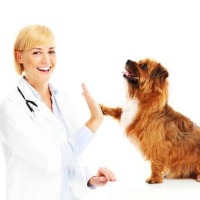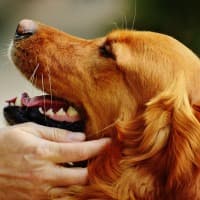FYI: If you buy something through a link on this site I may earn a commission - at NO extra cost to you.
Is Your Dog Panting and Shaking?
When a dog is panting and shaking, or panting and restless, it's generally safe to assume that something is wrong. But it's often not easy to tell whether it's due to something simple (such as being too hot or too cold) or something more serious (such as illness, pain or injury).
The clues to what's going on can usually be found by assessing your dog's physical condition, the situation he's in, and any other symptoms that he may be showing.
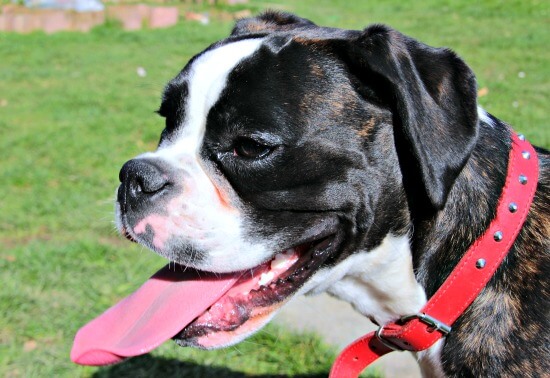
Why Is My Dog Panting?
Let's start with the panting part of the equation because it can be caused by so many different things, some serious, some not.
Sometimes it's easy to see why it's happening.... for example, if your dog has just played a vigorous game of fetch; been outside on a hot day; is feeling car-sick; is scared of July 4th fireworks or he's in a situation that is making him nervous, then heavy panting is to be expected.
At other times excessive, or abnormal, panting caused by something you can't see, or are unaware of. All of these things can cause your dog to pant heavily:
- Being too hot
- Anxiety or stress
- Fear (such as fear of thunderstorms or a new environment)
- Pain
- Excitement
- Getting older
- Digestive upset or nausea
- Heart Disease (such as congestive heart failure)
- Cushing's Disease (elevated cortisol levels)
- Poisoning
- Internal Injury
- Illness (including things like pneumonia, laryngeal paralysis, lung disease, heartworm infestation etc.)
- Heat Stroke
- Low Blood Sugar
- Adverse reaction to medication
Obviously some of them aren't medical emergencies, but some of them are.
It's also worth noting that certain dog breeds, specifically brachycephalic dogs (those with short muzzles, such as the Bulldog, French bulldog, Pug, Boston Terrier etc.) pant more than others in general. This is because the physical anatomy of the skulls means they have shorter, and narrower, nasal passages.
These breeds are more at risk of heat stroke as well as exercise induced breathing problems, so for owners of this type of breed, taking special care in these areas is important.
Dog Panting After Giving Birth?
Dogs can also pant heavily after giving birth due to the exertion and stress whelping puts on their bodies.
If your dog pants during labor, or for a few hours after all the puppies have been delivered, that's totally normal, and she should return to within about 24 hours.
Panting that continues into the second or subsequent days, or seems to be worse when she's nursing (which is pretty much ALL the time to be honest) then have your dog examined by your vet quickly. It could be a sign of infection, internal injury or eclampsia (caused by low blood calcium levels). These could all be extremely dangerous, even fatal.
Why Is My Dog Shaking?
If your dog is just shaking, shivering or trembling, that opens up another range of other possibilities.
Shaking by itself can still indicate nausea, excitement, fear, anxiety, pain or stress.
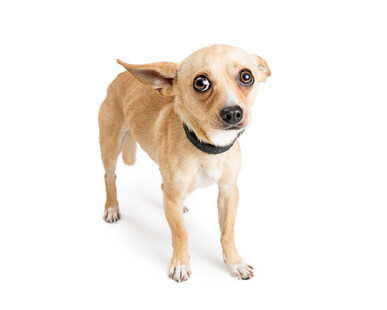
It's also common in older and elderly dogs due to age-related muscle weakness, this is normal and although a vet visit is in order to check it out, it's not an emergency.
But shaking in dogs can also be caused by other conditions such as:
- Neurological conditions (including Canine Cognitive Dysfunction which can affect older dogs)
- Distemper
- Kidney Failure
- Liver Disease
- Adrenal gland disorders
- Epilepsy
- Pancreatitis
- Bloat
- Generalized Tremor Syndrome (GTS)
- Addison's Disease
- Reaction to medication including flea/tick products
potential veterinary emergencies...
If your dog is panting and shaking (or either one) AND also shows any of these symptoms/behaviors you need to have him evaluated by a veterinarian right away:
- Severe shaking or trembling
- Excessive drooling, retching or gagging
- Whining or vocalizing (pain)
- Has an elevated temperature (heatstroke or illness)
- Bloated or rigid abdomen (bloat or internal injury)
- Stiffness, limping or reluctance to walk (injury)
- Lethargy, weakness or exhaustion
- Low blood sugar (hypoglycemia)
- Loss of co-ordination
- Vomiting and/or diarrhea (poisoning or illness)
- Pale gums (internal bleeding, illness)
- Breathing difficulty (ie gasping, wheezing etc.)
Why is my Panting and Restless
So, we looked at all the reasons why your dog may be panting, and also what can make dogs shaky, but there's another behavior which is often seen alongside panting (and sometimes shakiness), and that's restlessness.
In addition to panting, a dog who is restless may be:
- Pacing
- Circling
- Unable to sit still
- Whining
- Insomnia
The reasons for a dog to be panting and restless are similar to those for dogs who are shaking while panting. The most common include:
- Anxiety
- Pain
- Fear
- Excitement
- Illness
- Injury (not always externally visible)
- Reaction to medication
- Age related condition (such as dog dementia)
If you can't see a clear reason for your dog to be panting and restless (ie no thunderstorms or fireworks, it's not a hot day, no unusual or excessive exercise and so on), then it's a good idea to have him checked out by your veterinarian.
Illness or injury needs to be ruled out, and as these symptoms mean something isn't right, it's important to find out what's going on so that you can address it quickly.
When Panting, Shaking or Restlessness Isn't Serious
If you're familiar with the cause of your dogs panting, shaking, restlessness (eg. he's always terrified on July 4th, or when he rides in a car etc.) and you know his life isn't in danger then you have options in terms of treating the problem.
Treating stress/anxiety with natural methods can be very effective without the side effects of drugs.
Check out the Natural Remedies for Dog Anxiety on this page... Natural Remedies for Dogs, or try a Thundershirt or the new Thunderease pheromone products.
Giving your dog a safe spot to get away, or hide, such as a covered crate or corner in a darkened room can also help.
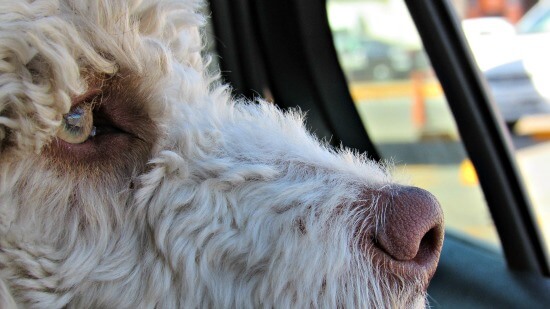
Car travel can make some dogs anxious as well as nauseous and cause shaking, panting, drooling and more. There are ways to desensitize your dog and to relieve his nausea and fear. Check out my Dog Travel Anxiety page for lots of tips and suggestions.
Low blood sugar, aka Hypoglycemia, which is most often seen in small and tiny breeds, CAN be serious, if not recognized and treated promptly. It can cause a dog to be shaky, wobbly and to pant.
Not eating frequently enough is the most common cause of hypoglycemia in small dogs who need to eat much more often than medium and large breeds.
The best thing to do if you notice signs of low blood sugar in your dog is to rub a little honey, maple syrup or Karo syrup onto his gums and/or put it under his tongue. Keep him warm. rested and encourage him to drink. If you don't see almost immediate improvement, take him to your veterinarian as either something else is wrong, or he needs more help than you can give at home.
you might also like...
- Home
- Dog Health Information
- Dog Panting and Shaking
FTC Disclosure: Some pages on this site contain affiliate links. I may earn on qualified purchases.
